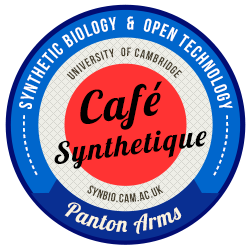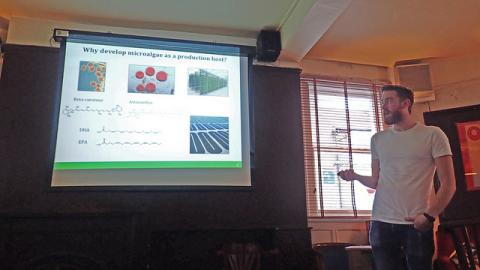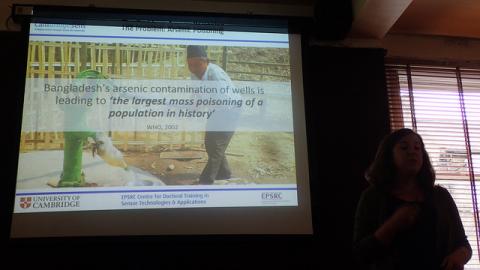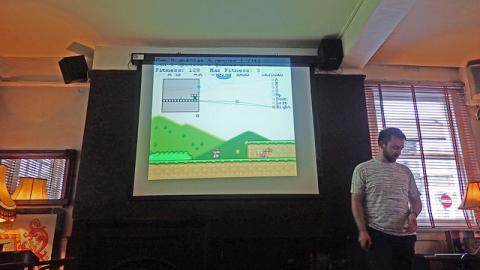
Submitted by Administrator on Mon, 04/09/2017 - 12:58
Cafe Synthetique this August gave the floor to a talented collection of graduate students working on synthetic biology projects around the University. It was an excellent insight into some cutting edge science and how these early career researchers view the future of biological engineering.
Jan Lyczakowski (Department of Biochemistry) from Prof Paul Dupree’s lab described his efforts to engineer the structure of the plant sugar xylan in order to extract more biofuel from woody biomass. By using an enzyme from the plant model organism Arabidopsis thaliana, several times more xylose sugar could be extracted and fermented into ethanol using engineered E.coli bacteria. Jan also brought along some 3D-printed models of xylan to provide a hands-on demonstration of the structure!
Algal synthetic biology featured heavily as Aleix Gorchs Rivera, Stefan Grossfurthner and Patrick Hickland from Prof Alison Smith’s Lab, in the Department of Plant Sciences, presented different approaches to engineering algae to generate valuable products, such as pigments and medicinal compounds.

Patrick’s work focuses on tools to engineer the brown alga Phaeodactylum tricornutum, which is not a common lab organism but has useful features like a rapid growth rate and high accumulation of lipids like omega 3 fatty acids. Specifically, Patrick has engineered an inducible on/off genetic switch in the alga and is now applying it to manipulate metabolic pathways and boost production of useful compounds.
Aleix and Stefan are both working with the more common model alga Chlamydomonas reinhardtii. Aleix presented his work building inducible genetic circuits to express in the algal chloroplast, which is a major site of protein production. He aims to tightly dose expression of interesting metabolic genes and even antibodies. Stefan is constructing a metabolic pathway for engineering and manipulating cytosolic production of sesquiterpenes, an interesting family of compounds including the anti-malarial drug artemisinin. He presented his current progress during the first year of his PhD and future plans.
From eukaryotes to cell-free biochemical systems, Tess Skyrme represented the Sensors Centre for Doctoral Training (Department of Chemical Engineering and Biotechnology), where 12 students have spent the summer designing and prototyping an arsenic biosensor. Their sensor produces glucose oxidase in the presence of arsenic which is detected electrochemically on a device that can send data from remote field locations such as wells in Bangladesh and Nepal, where arsenic contamination has been described as the ‘largest mass poisoning of a population in history’ (WHO, 2002). The team built an arsenic sensitive genetic circuit, tested multiple electrochemistries, and designed an open source potentiometer that is 10% the cost of commercially available options for almost equivalent functionality. They are now focused on integrating the device components ahead of Sensors Day on 20 Oct 2017.

Looking to the future and calling for a revolution in the way that biological experiments are performed, Clayton Rabideau provided an introduction to the current state of the art in machine learning and automation in synthetic biology. His presentation marked the first appearance of Mario Brothers at Cafe Synthetique, with a demonstration of how machine learning over many generations can result in large efficiency gains compared.

Efficiency was also a key driver for the increase in labs moving to automated liquid handling through open source lab robots like OpenTrons, new technologies such as the Labcyte Echo, which is available in Cambridge as part of the OpenPlant Synthetic Biology Centre, and fully automated ‘cloud labs’. However, Clayton also highlighted the ‘reproducibility crisis’ in experimental science and how increased use of machines to minimise human error might help. He ended by predicting that in the coming decades graduate students would spend far less time in the lab. This went down well with an audience whose most automated lab experience so far was reportedly ‘multi-channel pipettes’.
It’s the first time that Cafe Synthetique has featured a full line up of graduate students and we hope to repeat the successful format in the near future. If you are a graduate student working on a synthetic biology related topic and would like to present at the next Cafe Synthetique Grad Talks, get in touch!

